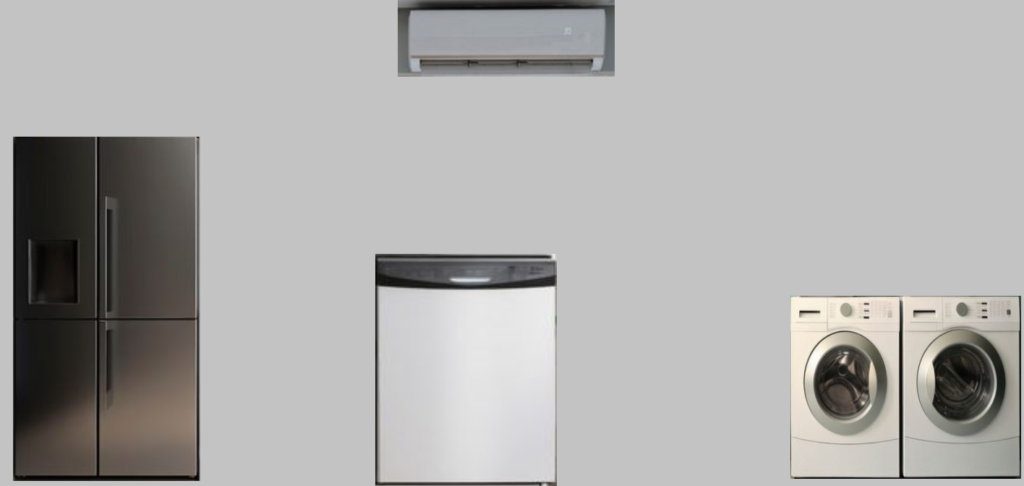Table of Contents
Introduction: Best Energy Efficient Appliances
Nowadays, upgrading to energy efficient appliances is one of the most impactful ways to achieve these goals, energy efficiency is not just a popular term, but a crucial aspect. It’s a necessity for homeowners looking to save money, reduce their environmental impact, and live more sustainably. This guide will walk you through the best energy-efficient appliances available and how they can transform your home.
Why Choose Energy Efficient Appliances?
Energy-efficient appliances are designed to use less electricity, water, and gas while performing their functions just as well, if not better, than their non-efficient counterparts. The benefits are clear:
- Lower Utility Bills: Reduced energy consumption directly translates to lower monthly bills.
- Environmental Impact: Less energy usage means fewer fossil fuels burned and reduced greenhouse gas emissions.
- Enhanced Home Value: Energy efficiency is a desirable feature for potential home buyers.
- Increased Comfort: Many energy-efficient appliances offer improved performance and additional features.
Top Energy-Efficient Appliances to Consider
1. Refrigerators
LG InstaView Door-in-Door Refrigerator
Description: Features an energy-efficient inverter linear compressor and advanced cooling technologies.
Energy Efficiency: Uses up to 32% less energy than conventional models.
Samsung Family Hub Refrigerator
Description: Equipped with a digital inverter compressor and smart features to optimize energy use.
Energy Efficiency: ENERGY STAR certified for maximum efficiency.
Whirlpool WRF560SEHZ Refrigerator
Description: Offers Accu-Chill temperature management and adaptive defrost.
Energy Efficiency: Consumes 20% less energy than older models.
GE Profile PVD28BYNFS Refrigerator
Description: Features TwinChill evaporators and a Turbo Cool setting.
Energy Efficiency: ENERGY STAR certified for reduced energy consumption.
2. Dishwashers
Bosch 800 Series Dishwasher
Description: Uses advanced water filtration and efficient jets, consuming less water and energy.
Energy Efficiency: ENERGY STAR certified with EcoSilence motor.
Miele EcoFlex Dishwasher
Description: Features AutoOpen drying and soil sensors to enhance efficiency and performance.
Energy Efficiency: Uses minimal water and electricity per cycle.
KitchenAid KDTM404KPS Dishwasher
Description: Incorporates FreeFlex third rack and advanced wash systems.
Energy Efficiency: ENERGY STAR certified for optimal performance.
LG LDP6810SS Dishwasher
Description: Equipped with QuadWash and TrueSteam technologies for efficient cleaning.
Energy Efficiency: Each cycle uses less water and energy.
3. Washing Machines
LG WM9000HVA Front-Load Washer
Description: High-efficiency model with TurboWash technology to save water and energy.
Energy Efficiency: Uses up to 50% less water and energy.
Samsung WF45K6500AV AddWash Washer
Description: Incorporates steam cleaning and automatic load sensing for optimal efficiency.
Energy Efficiency: ENERGY STAR certified with VRT Plus technology.
Whirlpool WFW9620HC Front-Load Washer
Description: Features Load & Go XL dispenser and Adaptive Wash technology.
Energy Efficiency: ENERGY STAR certified with low energy consumption.
Electrolux EFLS627UTT Front-Load Washer
Description: Offers SmartBoost technology and LuxCare wash system.
Energy Efficiency: Highly efficient with ENERGY STAR certification.
4. Dryers
Whirlpool WED7990FW HybridCare Heat Pump Dryer
Description: Uses a heat pump to recycle hot air, significantly reducing energy consumption.
Energy Efficiency: ENERGY STAR certified, using up to 73% less energy.
LG DLEX3700W Ultra Large Capacity Dryer
Description: Equipped with sensor dry technology to prevent over-drying and save energy.
Energy Efficiency: ENERGY STAR certified with efficient drying cycles.
Samsung DV22N6800HW Heat Pump Dryer
Description: Compact model with innovative heat pump technology.
Energy Efficiency: Uses up to 50% less energy than conventional dryers.
Bosch WTW87NH1UC Heat Pump Dryer
Description: Features gentle drying and self-cleaning condenser.
Energy Efficiency: ENERGY STAR certified with low energy usage.
5. Ovens and Stoves
GE Profile PHS930SLSS Induction Range
Description: Heats pots and pans directly, offering precise and energy-efficient cooking.
Energy Efficiency: Consumes less energy with faster cooking times.
Bosch HBL8651UC Double-Wall Oven
Description: Features convection cooking to reduce cooking times and energy usage.
Energy Efficiency: ENERGY STAR certified with efficient cooking modes.
Samsung NE58K9560WS Induction Range
Description: Provides precise temperature control and quick heating.
Energy Efficiency: Induction technology reduces energy consumption.
Whirlpool WOS97EC0HZ Smart Wall Oven
Description: Features True Convection cooking and smart capabilities.
Energy Efficiency: ENERGY STAR certified with efficient baking and roasting.
6. Water Heaters
Rheem Performance Platinum Hybrid Electric Water Heater
Description: Combines heat pump technology with traditional heating elements for maximum efficiency.
Energy Efficiency: Uses up to 75% less energy than standard electric water heaters.
Rinnai RUC98iN Tankless Water Heater
Description: Provides hot water on demand, reducing standby energy loss.
Energy Efficiency: ENERGY STAR certified with high efficiency.
AO Smith HPTU-50 Voltex Hybrid Electric Heat Pump Water Heater
Description: Uses heat pump technology to deliver efficient hot water.
Energy Efficiency: Consumes up to 62% less energy than conventional models.
EcoSmart ECO 27 Electric Tankless Water Heater
Description: Delivers endless hot water with compact design.
Energy Efficiency: Highly efficient with minimal energy waste.
7. HVAC Systems
Trane XV20i Variable Speed Air Conditioner
Description: Utilizes variable-speed technology for precise and efficient cooling.
Energy Efficiency: SEER rating up to 22 for superior energy savings.
Carrier Infinity 98 Gas Furnace
Description: Features Greenspeed intelligence to adapt heating output and maximize efficiency.
Energy Efficiency: AFUE rating up to 98.5% for high efficiency.
Lennox XC25 Air Conditioner
Description: Offers variable-capacity operation for optimized cooling.
Energy Efficiency: SEER rating of up to 26, making it highly efficient.
American Standard Platinum 95 Gas Furnace
Description: Delivers consistent, efficient heating with modulating gas valve.
Energy Efficiency: AFUE rating up to 97.3% for maximum efficiency.
How to Choose the Right Energy Efficient Appliances
Selecting the right energy-efficient appliances involves considering several factors:
- Energy Efficiency Ratings: Look for the ENERGY STAR label and read the EnergyGuide labels to understand energy consumption and cost savings.
- Size and Capacity: Choose appliances that fit your household needs to avoid underutilization or overuse, which can negate efficiency gains.
- Features and Functionality: Prioritize appliances with advanced features that enhance efficiency and convenience.
- Budget: While energy-efficient appliances may have a higher upfront cost, they offer substantial savings over time through reduced utility bills.
Long-Term Benefits of Energy-Efficient Appliances
Changing to energy-saving appliances results in a variety of lasting advantages that go beyond initial financial benefits.
- Extended Lifespan: Energy-efficient appliances are often built with higher-quality components and technology, leading to longer operational lives.
- Government Incentives: Many regions offer rebates, tax credits, or other incentives for purchasing energy-efficient appliances.
- Environmental Stewardship: Reducing your home’s energy consumption helps lower your overall carbon footprint, contributing to global sustainability efforts.
A Closer Look: The Science Behind Energy Efficiency
Energy-efficient appliances achieve their performance through a combination of innovative technologies and design improvements. For instance, modern refrigerators use high-efficiency compressors and better insulation to maintain temperatures with less energy. Dishwashers now have soil sensors that adjust water usage based on the cleanliness of the dishes, ensuring no water is wasted. Washing machines have evolved to use less water per cycle, often incorporating steam to boost cleaning power without excessive water use.
Induction cooktops use magnetic fields to directly heat pots and pans, resulting in less energy loss compared to gas or traditional electric stoves. Heat-pump dryers use refrigeration technology to extract moisture from clothes, making them significantly more efficient than conventional dryers.
These advancements are supported by rigorous testing and certification processes. The ENERGY STAR program, for example, is a voluntary certification that ensures appliances meet strict energy efficiency criteria set by the U.S. Environmental Protection Agency. When you purchase an ENERGY STAR certified appliance, you can be confident it will deliver on both performance and efficiency promises.
Practical Tips for Maximizing Energy Efficiency at Home
- Regular Maintenance: Keep your appliances in good shape by taking care of them regularly. Clean filters, check seals, and follow manufacturer recommendations for servicing.
- Smart Usage: Use appliances efficiently. For instance, run dishwashers and washing machines with full loads to maximize water and energy use.
- Upgrade Wisely: When it’s time to replace old appliances, opt for energy-efficient models. Even if your current appliance is still functioning, the long-term savings from an upgrade can be significant.
- Energy Audits: It would be beneficial to have a professional energy audit done to discover any other areas in your home that could be optimized for better energy efficiency.
Environmental Stewardship: Reducing your home’s energy consumption helps lower your overall carbon footprint, contributing to global sustainability efforts.
A Closer Look: The Science Behind Energy Efficiency
Energy-efficient appliances achieve their performance through a combination of innovative technologies and design improvements. For instance, modern refrigerators use high-efficiency compressors and better insulation to maintain temperatures with less energy. Dishwashers now have soil sensors that adjust water usage based on the cleanliness of the dishes, ensuring no water is wasted. Washing machines have evolved to use less water per cycle, often incorporating steam to boost cleaning power without excessive water use.
Induction cooktops use magnetic fields to directly heat pots and pans, resulting in less energy loss compared to gas or traditional electric stoves. Heat-pump dryers use refrigeration technology to extract moisture from clothes, making them significantly more efficient than conventional dryers.
These advancements are supported by rigorous testing and certification processes. The ENERGY STAR program, for example, is a voluntary certification that ensures appliances meet strict energy efficiency criteria set by the U.S. Environmental Protection Agency. When you purchase an ENERGY STAR certified appliance, you can be confident it will deliver on both performance and efficiency promises.
Practical Tips for Maximizing Energy Efficiency at Home
- Regular Maintenance: Keep your appliances in top condition with regular maintenance. Clean filters, check seals, and follow manufacturer recommendations for servicing.
- Smart Usage: Use appliances efficiently. For instance, run dishwashers and washing machines with full loads to maximize water and energy use.
- Upgrade Wisely: When it’s time to replace old appliances, opt for energy-efficient models. Even if your current appliance is still functioning, the long-term savings from an upgrade can be significant.
- Energy Audits: Consider having a professional energy audit to identify additional areas where your home can improve its energy efficiency.
Conclusion
Upgrading to energy-efficient appliances is one of the best investments you can make for your home. Not only will you enjoy immediate savings on your utility bills, but you’ll also contribute to a more sustainable future. With a wide range of energy-efficient options available, from refrigerators to water heaters, there’s never been a better time to make the switch. Embrace the change and experience the benefits of a more efficient, environmentally friendly home.



